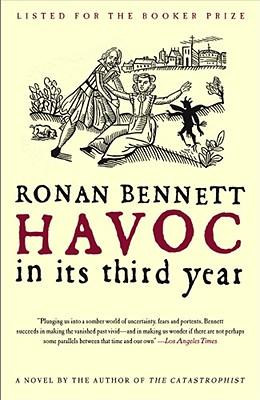
The time is the early seventeenth century, as the quarrel between Royalists and Parliamentarians turns toward civil war, and that between Catholics and Protestants leads toward bloody religious tyranny; the place is a town in northern England, set in a grim landscape swept by crop failures, plague and rumors of war, in which rigid Puritans have taken over government and imposed their own rules.
At the center of the novel is John Brigge, the Coroner and a Governor of the town, though not by any means as convinced a zealot as his fellow governors have become. Married and deeply in love with Elizabeth, who is pregnant with their first child, he has a guilty secret to hide in his affection for Dorcas, his wife's ward -- a secret which, in the world of religious prejudice and extremism toward which England is moving, can be lethal.
Determined to obey the law, rather than prejudice and the need to make an example of an Irishwoman accused of murdering her own infant, Brigge draws upon himself the hostility and suspicion of the powerful men who have been his fellow governors and who now set out to destroy him in the name of morality.
Brigge is both sympathetic and deeply vulnerable. He genuinely loves Elizabeth and longs for their child to be born, but he is also deeply attracted to Dorcas; he is, however guardedly, of "the old faith" and does not hesitate to hide a priest; he favors the wretched vagrants who infest the roads, seeking shelter and a bite to eat, and employs one of them on his farm. He insists on finding out the truth about the Irishwoman's baby, despite the fact that everybody has already decided on her guilt. In short, without intending to do so, John Brigge offers himself up as a victim by refusing to cooperate with the political and religious masters of the town or to subordinate his own conscience to their demand for rigid obedience and piety. Even his own clerk Adam, whom he regards as a son, turns against him in the end in a struggle that will almost cost Brigge his life and that sends him out into a cold and dangerous world, having sacrificed everything he once held dear, stripped of his power and authority, but made heroic by his commitment to love, truth and human feelings.
Havoc, in Its Third Year is a novel of great power, drama and terror, at once a love story and a superb work of historical fiction. It confirms Ronan Bennett's reputation as a masterful creator.
The time is the early seventeenth century, as the quarrel between Royalists and Parliamentarians turns toward civil war, and that between Catholics and Protestants leads toward bloody religious tyranny; the place is a town in northern England, set in a grim landscape swept by crop failures, plague and rumors of war, in which rigid Puritans have taken over government and imposed their own rules.
At the center of the novel is John Brigge, the Coroner and a Governor of the town, though not by any means as convinced a zealot as his fellow governors have become. Married and deeply in love with Elizabeth, who is pregnant with their first child, he has a guilty secret to hide in his affection for Dorcas, his wife's ward -- a secret which, in the world of religious prejudice and extremism toward which England is moving, can be lethal.
Determined to obey the law, rather than prejudice and the need to make an example of an Irishwoman accused of murdering her own infant, Brigge draws upon himself the hostility and suspicion of the powerful men who have been his fellow governors and who now set out to destroy him in the name of morality.
Brigge is both sympathetic and deeply vulnerable. He genuinely loves Elizabeth and longs for their child to be born, but he is also deeply attracted to Dorcas; he is, however guardedly, of "the old faith" and does not hesitate to hide a priest; he favors the wretched vagrants who infest the roads, seeking shelter and a bite to eat, and employs one of them on his farm. He insists on finding out the truth about the Irishwoman's baby, despite the fact that everybody has already decided on her guilt. In short, without intending to do so, John Brigge offers himself up as a victim by refusing to cooperate with the political and religious masters of the town or to subordinate his own conscience to their demand for rigid obedience and piety. Even his own clerk Adam, whom he regards as a son, turns against him in the end in a struggle that will almost cost Brigge his life and that sends him out into a cold and dangerous world, having sacrificed everything he once held dear, stripped of his power and authority, but made heroic by his commitment to love, truth and human feelings.
Havoc, in Its Third Year is a novel of great power, drama and terror, at once a love story and a superb work of historical fiction. It confirms Ronan Bennett's reputation as a masterful creator.
Paperback
$17.95